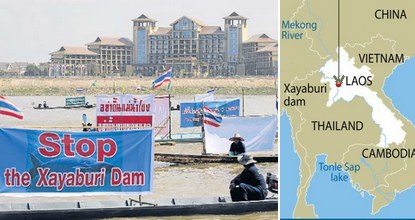
VIENTIANE: The Lao government has approved the construction of the US$3.5-billion Xayaburi dam on the Mekong River despite objections from environmentalists, said a senior official Monday.
"We will have a ground-breaking ceremony in Xayaburi on Wednesday," said Viraphonh Viravong, deputy minister of energy and mines.
The ceremony will mark the beginning of work in the river bed, with construction on access roads and facilities already under way.
The hydroelectric project is to be the first run-of-river dam to be built on the lower Mekong. Four dams have already been built on the upper Mekong in China.

The project has been criticised by environmentalists, neighbouring countries and downstream riverside communities for its possible impact on the flow of sediments and fish migration.
An organisation called the Network of Thai People in Eight Mekong Provinces held a flotilla protest Monday of 45 boats on the Thai side of the river in Nong Khai, across from Vientiane which is currently hosting the Asia-Europe Meeting that has drawn about 50 Asian and European leaders to the Lao capital.
"We want the visiting leaders to be aware of the Xayaburi dam project and the impact it is going to have on people living downstream," said the network's spokeswoman Pianporn Deetes.
"We've already seen a negative impact from the Chinese dams on the upper Mekong in terms of greater fluctuations in the river's flow."
There are 10 more dams planned on the lower Mekong, Southeast Asia's longest river and one of the world's richest sources of fish, worth an estimated $2 billion per annum.
Last December, members of the Mekong River Commission's council, consisting of water and environment ministers from Cambodia, Laos, Thailand and Vietnam, urged a delay to allow further environmental research.
In response, the Lao government and its chief partner in the project, Thailand's Ch Karnchang Plc, agreed to spend an additional $100 million to revamp the design of a fish ladder and sediment flow gates.
The recommendations were made by project consultants Poyry of Finland and the French Compagnie Nationale du Rhone and incorporated into a new design for the project.
"They have no more serious complaints on the redesign of the dam," said Mr Viraphonh of Laos' neighbours.
The country already has 13 hydroelectric plants in operation with a total capacity for 3,000 megawatts.
The Xayaburi project, to be operational by 2019, will be one of its largest, with more than 90% of its electricity to be exported to neighbouring Thailand.
"Xayaburi is a very good project," he said. "The financing is there and if we don't go ahead what are we expected to do? Solar farming? It's too expensive."
Pienporn Deetes, International Rivers' campaign coordinator for Thailand, criticised the Lao's government decision to go ahead with construction.
Villagers downstream will be severely affected by the dam, she told the Bangkok Post, adding cross-border impacts will be greater after the construction, including ecological damage and the effect on the livelihood of people along the river.
"What we wanted to see was a decision based on knowledge rather than economic and political reasons," said Ms Pienporn. "This is not a project that will bring about sustainability for people in the region."
She rejected the revamped environmental report,saying it was hastily written with no consultation from downstream members. "We've never seen the study," she added.